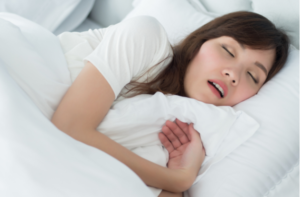Understanding bruxism
 Bruxism is the medical term for the clenching or grinding your teeth. It is considered a sleep disorder because it often happens during sleep. However, there are individuals who may find that they are clenching and grinding their teeth during the day as well. People with bruxism may unconsciously clench their teeth when they are stressed or focused on something, and it can also happen during sleep. Bruxism can cause headaches, jaw pain, and damage to your teeth. In severe cases, it might lead to conditions such as TMJ disorders. By seeking a proper diagnosis and discussing treatment options for your smile with our Mount Pleasant, MI, area dentist, you can put an end to bruxism and achieve a healthy, fully-functioning smile.
Bruxism is the medical term for the clenching or grinding your teeth. It is considered a sleep disorder because it often happens during sleep. However, there are individuals who may find that they are clenching and grinding their teeth during the day as well. People with bruxism may unconsciously clench their teeth when they are stressed or focused on something, and it can also happen during sleep. Bruxism can cause headaches, jaw pain, and damage to your teeth. In severe cases, it might lead to conditions such as TMJ disorders. By seeking a proper diagnosis and discussing treatment options for your smile with our Mount Pleasant, MI, area dentist, you can put an end to bruxism and achieve a healthy, fully-functioning smile.
What are some treatment options available for those with bruxism?
Treating bruxism usually involves a series of combined treatments for the best results. Below are just some of the more commonly recommended ways to reduce or eliminate bruxism and the symptoms and consequences of this condition:
- Reduce stress and stress triggers when possible: One of the best things you can do to reduce bruxism is to lower stress levels in your life. If certain activities, people, places, or thoughts trigger stress and teeth grinding, try to avoid them when possible. Relaxation techniques, including yoga, meditation, or aromatherapy, can help to reduce stress.
- Change some daily habits: There are some everyday habits that can contribute to bruxism, so making some changes can be helpful in reducing symptoms. For example, if you tend to chew on objects such as pencils or ice cubes when you’re anxious or concentrating, breaking this habit can help. In addition, avoiding caffeine and alcohol before bedtime can also be beneficial, as they can both contribute to a night of more restless sleep.
- Wear a mouth guard: Wearing a mouth guard at night is often recommended for people with bruxism. A mouth guard helps to protect your teeth from the damage of grinding and clenching, as well as reduce any jaw pain or headaches that may be associated with this condition.
- Botox injections: Botox injections are another option that may be recommended in some cases. Botox can help relax the muscles of the jaw, leading to reduced teeth grinding and clenching.
Learn more about bruxism
Call Dr. Kenneth Egger of Mount Pleasant, MI, at 989-773-3560 today to learn more about treatment options for bruxism.
